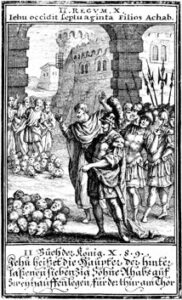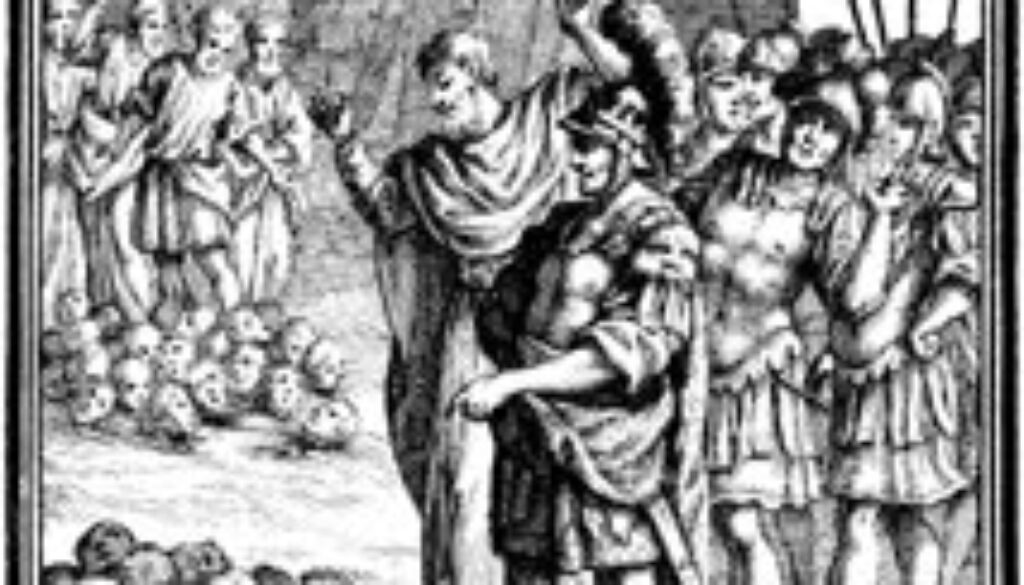2 Kings 10 Jehu Finishes the Job

Jehu has begun eliminating the line of Ahab. Jehu finishes the job in Israel. Athaliah finishes it in Judah. This is God’s judgment for Ahab’s deeds.
I forgot to read ahead in 2 Kings, and thought that the job of eliminating Ahab’s line was finished already. It’s funny how, even after having read through these stories at least twice, I forget things. I’m wondering if I will be as forgetful after this time through. I’m hoping these stories stick with me as deeply as some of the other books I have read. Then again, I don’t think I remember all of any book I’ve read. Just the parts that truly stand out to me.
This is an important part of the story though. Ahaziah and Jehoram were not the only sons of Ahab. He has 70 more. Ahaziah was Ahab’s oldest and Jehoram was second. At the time of Jehoram’s death, he was around 44 years old. Many of the 70 sons of Ahab were still young. Some may have had children. Maybe there was a grand child or two among them, but age precludes too many of them.
Ahab’s children were not being brought up in his home, but by members of the community in Samaria. Those in charge of them will surrender them to death.
There is one small exception, and that is the infant son of Ahaziah of Judah. He is the only survivor of the royal line of David, after Athaliah gets through with her evil deeds. Those protecting him will NOT surrender him to death. He is spared by God as a remembrance of David. Without this hidden child, the line of David would have ended. God would NOT let that happen. Let’s rejoin our story and see the conclusion of a line that God DID want to end; Ahab’s. Lead on Holy Spirit, and we will follow.
♥ ♦ ♥
Jehu has just dispatched both ruling kings of Israel and Judah. They were both descendants of Ahab, and the Lord has called him to rid the world of Ahab’s line. It is time to finish the job.
Jehu served under Ahab and he knows the whereabouts of all of Ahab’s sons. Many of them are still fairly young. All of them have been ‘farmed out’ to leading men in the city. Only those born to Jezebel were raised in the palace. Sons from any other source were separated from their mothers and sent away. Ahab still supported them, but they did not see him while he lived. After his death, the throne still paid for their care but had no interaction with them.
Jehu is not yet ready to take the throne. He knows that it has been given to him by the Lord, but there are others who have more right to it than he does. In truth, Ahab’s sons are the rightful successors. Jehu has to at least make it appear as though he is following tradition.
To appear as though he is open to following tradition, Jehu writes letters to those who have charge over Ahab’s sons. This is a LOT of letters. He writes to the rulers of the city, the elders, and the guardians of the sons. Fortunately, he only had to write the letter once. The scribe copied it for him all that he needs.
“Now then, as soon as this letter comes to you, seeing your master’s sons are with you, and there are with you chariots and horses, fortified cities also, and weapons, select the best and fittest of your master’s sons and set him on his father’s throne and fight for your master’s house” (2 Kings 10:2-3).
Satisfied with the letter, Jehu has messengers deliver copies to all those in authority, of the city and of Ahab’s descendants. Those who receive the letters tremble in fear after reading them. They have no immediate answer to send with the messengers back to Jehu. Once all the messengers leave, a meeting is called of all those who received the message.
The meeting is held in a small room in the palace. And that room is filled with anxious men.
“He is trying to trap us! If we choose one of Ahab’s sons to sit on his throne, Jehu will kill him and whomever raises him up.”
“Are you sure of this?”
“Behold, the two kings could not stand before him. How then can we stand?” (2 Kings 10:4).
“You are right. So, what should we do?”
“We need to send him a message of support. Maybe then he will let us live.”
A message is quickly composed and agreed upon. “We are your servants, and we will do all that you tell us. We will not make anyone king. Do whatever is good in your eyes” (2 Kings 10:5).
The message does not go out until the next morning and reaches Jehu within hours of sending it. Jehu reads the reply carefully. “So, they are afraid of me. Let’s see if they truly stand with me, or if they are only making a pretense to do so in order to spare their own lives” thinks Jehu.
Jehu pens another message. This one will demonstrate for certain where these men’s loyalty lies. As soon as it is finished, he has the same messenger take it back to Samaria.
The leader of the group receives the message. He reads Jehu’s words. “If you are on my side, and if you are ready to obey me, take the heads of your master’s sons and come to me at Jezreel tomorrow at this time” (2 Kings 10:6).
Word goes out immediately, and quietly, to all those who are over Ahab’s sons. If any of Ahab’s sons were to learn of this plan, they would flee to the country and not be among the heads presented to Jehu. Jehu would know and would believe that their escape was intentional. The guardian would then forfeit his life.
Ahab’s sons are taken out, one or two at a time, to a place where they are beheaded quickly. The heads of their brothers are hidden from view, so as not to frighten or alert them. This must be done to satisfy Jehu, but it doesn’t have to be done with cruelty.
All 70 heads are assembled by mid afternoon and put in baskets. The guardians of Ahab’s sons chose to send the heads with a courier. They want nothing more to do with this. A cart is loaded with the baskets and it leaves Samaria for Jezreel. Those watching it make its way through the city gate shake their heads in shame. They know of Elisha’s prophecy concerning the house of Ahab. They simply wish they didn’t have to be part of it.
A messenger runs to Jehu when the cart is close to the city. “They have brought the heads of the king’s sons” (2 Kings 10:8a).
Jehu nods then says; “Lay them in two heaps at the entrance of the gate until the morning” (2 Kings 10:8b).
Those who have to pass by the gate, do so as quickly as possible. It is a gruesome thing to behold. Empty eyes staring out at nothing, swollen tongues protruding between the teeth, fragments of bone sticking out of the severed necks, and worst of all, the FLIES moving about on them!
Jehu comes out of the gate early the next morning. He sees the gruesome display but he does not turn away from it. He calls out to the people. “You are innocent. It was I who conspired against my master and killed him, but who struck down all these? Know then that there shall fall to the earth nothing of the word of the Lord, which the Lord spoke concerning the house of Ahab, for the Lord has done what he said by his servant Elijah” (2 Kings 10:9-10).
Jehu calls for the heads to be removed and burned in the fire. Their ashes are to be tossed on the grave of Ahab, for it was his sin that damned them. Jehu is not finished though. It is time to ‘clean’ Jezreel of the house of Ahab.
Jehu knew Ahab intimately and has no trouble identifying those who supported him, those who were his close friends, his priests, and his remaining children. Jehu’s forces follow his instructions to the letter and, by the time the sun set that day, not a single soul connected to the house of Ahab in Jezreel still breathed.
Jehu is still not done though. After a good night’s sleep, he sets off for Samaria to compete the next portion of his cleansing of Israel. On the way, he stops at Beth-eked of the Shepherds to water his horses and refresh his waterskins. While there, he encounters a group of people traveling together. They have chariots and horsemen leading them on their way. It is clear that they are of royalty. Jehu approaches them.
“Who are you?” (2 Kings 10:13a) he asks.
They have no idea what has happened in Israel, so they answer without fear. “We are the relatives of Ahaziah, and we came down to visit the royal princes and the sons of the queen mother” (2 Kings 10:13b).
Jehu calls out to his men; “Take them alive” (2 Kings 10:14).
Jehu’s men easily subdue the group and hold them fast. Jehu goes and stands beside the pit of Beth-eked. “Bring them to me, two at a time” orders Jehu.
When each pair is brought to Jehu, he runs them each through with his sword and has their bodies dumped into the pit. Jehu repeats this process 21 times as he removes from this world 42 more descendants of Ahab.
As Jehu continued his journey to Samaria, he came across someone he considered a good friend and a faithful man of God. His name is Jehonadab. Jehu calls out to him in greeting.
“Is your heart true to my heart as mine is to yours?” (2 Kings 10:15a).
Jehonadab recognizes his friend immediately and answers him heartily. “It is” (2 Kings 10:15b).
Jehu stretches out his hand and says; “If it is, give me your hand” (2 Kings 10:15c).
Jehonadab grasps Jehu’s hand and is helped into the chariot beside Jehu. Jehu snaps the reigns and his horse takes off. He calls over to Jehonadab, above the sound of the chariot; “Come with me, and see my zeal for the Lord” (2 Kings 10:16).
The two ride on to Samaria. Jehu never promised those who took care of Ahab’s sons imunity. Jehu arrives in Samaria when the sun is at its zenith. Everyone connected with Ahab’s house is rounded up, just like they were in Jezreel. By the time the sun sets there is not a single person connected with the house of Ahab in all of Israel who still breathes.
Jehonadab is in awe of Jehu’s dedication to the words of the prophet Elisha. He is truly the Lord’s instrument. Jehu is still not done though. Ahab’s house is gone, but the despicable Baal is not. Jehu intends to do something about this too. This will take finesse and subterfuge.
Early the next morning, Jehu sends a call throughout all of Israel. “Ahab served Baal a little, but Jehu will serve him much. Now therefore call to me all the prophets of Baal, all his worshipers and all his priests. Let none be missing, for I have a great sacrifice to offer to Baal. Whoever is missing shall not live” (2 Kings 10:18-19).
The priests of Baal are ecstatic! Not since Jezebel has anyone called them together so fully. Jehu’s words regarding serving Baal are most welcome. King Jehoram did not serve them and did not provide for them, as Jezebel had.
When the priests had all gathered, Jehu went even farther. “Sanctify a solemn assembly for Baal” (2 Kings 10:20).
Shouts of joy go up all around. Messengers are sent throughout all of Israel, calling together ALL those who serve Baal. While those loyal to Baal are being summoned, Jehu is putting another part of his plan into action.
Jehu has gathered 80 of his most loyal men. “You are to station yourselves all around the temple of Baal. Be close by, but not visible at first. When you see me go in and shut the door, move into position. NO ONE, except myself and Jehonadab are to leave that temple alive. When we exit, you move in. Slaughter every last worshiper of Baal. ‘The man who allows any of those whom I give into your hands to escape shall forfeit his life’ (2 Kings 10:24).”
Within two days, Samaria is filled with worshipers of Baal. The all squeeze into the temple of Baal. There is barely room to breathe!
Jehu stands on the steps looking into the temple at the crowd. He turns to the one who is in charge of the wardrobe; the regalia for the worship for both layperson and priest. “Bring out the vestments for all the worshipers of Baal” (2 Kings 10:22).
Once the vestments are in hand, Jehu and Jehonadab follow the priest carrying the vestments into the temple. Jehu pushes his way through the mass of people and makes his way to the altar. From in front of the altar, Jehu calls out to the whole room of worshipers.
“Search, and see that there is no servant of the Lord here among you, but only the worshipers of Baal” (2 Kings 10:23).
The whole room begins searching the faces of one another; looking for an unfamiliar face. When no worshipers of the Lord are identified, Jehu steps to the side and allows the high priest of Baal to make his sacrifice.
As the calf roasts on the altar and fills the room with smoke, Jehu and Jehonadab slip out the door. Jehu turns to the guards and says; “Go in and strike them down; let not a man escape” (2 Kings 10:25).
The guards draw their swords and start slashing their way through those in the temple of Baal. The guards at the doors and windows make certain that no one escapes alive. Once there is no one still breathing within the temple, the guards haul the bodies outside. Then they rush back into the inner sanctuary of Baal and tear down his pillar. They drag it outside and burn it. The last step is to demolish the temple itself.
Walls are battered down, the roof is ripped up, the windows smashed, anything inside is ground to dust under the soldiers’ feet, and the altar is desecrated by soldiers peeing on it. Nothing remains of the worshipers of Baal or his temple when Jehu and his men are finished.
When the dust settles and their righteous energy is spent, Jehu’s men follow him to the palace where he takes his seat on the throne.
“Long live King Jehu” they shout in unison.
Jehu systematically wiped-out Baal worship from the face of Israel. Not an altar or shrine survived his search. The night in which the last shrine was destroyed, the Lord spoke to Jehu in the night.
“Because you have done well in carrying out what is right in my eyes, and have done to the house of Ahab according to all that was in my heart, your sons of the fourth generation shall sit on the throne of Israel” (2 Kings 10:30).
Jehu’s zeal for the Lord did not include tearing down the golden calves that Jeroboam had erected in Dan and Bethel. These Jehu allowed and encouraged Israel to worship. Jehu did not follow the Lord with his whole heart and the Lord began chipping away at Israel’s territories because of it.
King Hazael defeated Israel throughout the land. He took from Israel all the territory to the east of the Jordan. “from the Jordan eastward, all the land of Gilead, the Gadites, and the Reubenites, and the Manassites, from Aroer, which is by the Valley of the Arnon, that is, Gilead and Bashan” (2 Kings 10:33).
Jehu reined over Israel from Samaria for 28 years. When he died, they buried him in Samaria and his son, Jehoahaz reined in his place.
(to be continued)
When we left Jehoram of Israel, I commented that he was the closest to a godly king that Israel had. I think Jehu was even better. Or at least on the same par with Jehoram. Jehu was God’s right hand in judging the house of Ahab. It is interesting that even Ahab’s friends were killed. That tells me that the men who beheaded Ahab’s sons lost their lives too. Maybe it was to pay for murdering them. I don’t know, but God does. I will let Him judge.
It hurts seeing someone SO CLOSE to following God, but not taking that final step. It is like those today who believe that ‘doing good works’ is enough to get them into Heaven. They don’t take the step of accepting Jesus’ work on the cross and asking him as their Savior. There is NO getting into Heaven without going through Jesus. No way around. No way under. No way over. Only through. Pretending doesn’t do it either. There has to be a real relationship with ALL of God; Father, Son, and Spirit.
Father God, I don’t want to go up to the line and stop. I want to fall over, right into Your lap and never leave it. I cannot imagine my life without You! I certainly wouldn’t be alive today to contemplate it. I want ALL of You and I want to give You all of me. Forgive me for the times I try and hide parts of me, hoping You won’t see how messed up they are. “Under Construction”




